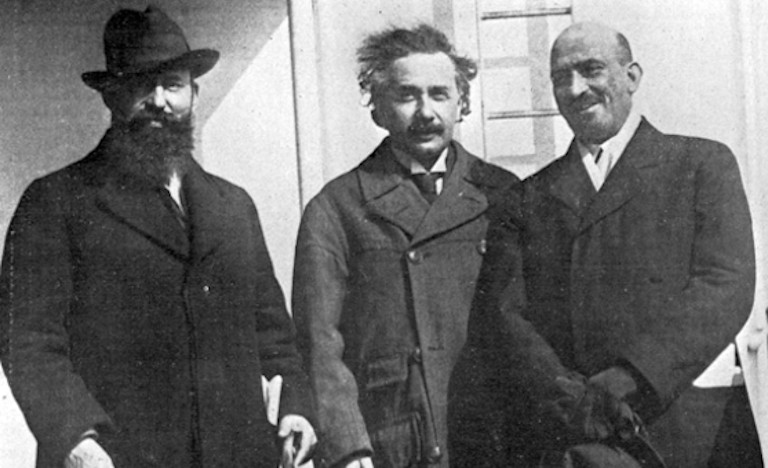Religion and Politics

Lost Jew
Like most things, Albert Einstein's relationship with religion was very unconventional.
He was born into a Jewish family who cared little for the Jewish faith. That even
went so far as to go to a Catholic school, not a Jewish one. He enjoyed what he
learned about Catholicism and even helped fellow students with their work. When
Einstein went to high school, he received his first formal lessons about the Jewish faith.
He was very interested in these lessons and was inspired to study the customs of the
Jewish religion. This opposition to his parents' religious indifference may have been
an early manifestation of his rebellion.
Einstein's enthusiasm for the Jewish faith was soon overshadowed by his passion
for a new religion, science. In high school and in private, Einstein began to
dazzle the works of great scientists and philosophers. These rational works made
Einstein feel that the Bible had lied to him. Although his aversion to the formalities
of an organized faith stayed with him for the rest of his life, he later denied his
disbelief in God and found a new belief in the beauty and order of nature.
He even openly ridiculed others' atheism as a form of hypocrisy.
The Activist
During the early decades of the 20th century, Einstein supported the cause of
Zionist Jews who advocated the formation of their own homeland. Einstein became
such an advocate of Zionism that during his visit to the United States in 1921,
he used his growing celebrity to raise money for the Zionist cause. However,
his enthusiasm then declined. Einstein's aversion to nationalism eventually
left him wondering whether forming a nationalist people of Jews would yield more
problems than benefits. He also criticized the way Britain handled the formation
of the state of Israel when it finally came into existence in 1948.
Einstein once described himself as a militant pacifist willing to fight for peace.
He urged young men not to do military service. He said, "Nothing will end war
unless people themselves refuse to go to war". This view became less absolute
as Einstein grew older and he realized that the only way to stop Adolf Hitler
was military action, but it never completely disappeared.
Einstein's strongly believed that all races were equal. When he showed up in
Princeton, he became an outspoken opponent of racial discrimination in the US.
Political science
Einstein's sense of justice and aversion to class divisions clearly
gave him a left-wing political touch. He was a social democrat.
He did not associate with any political party because he thought
it was a symptom of lazy thinking and he believed that achieving
world peace was more important than any political model in any country.
In 1952, Einstein was given the opportunity to put his political
ideals into practice. When Israel's first president, Chaim Weizmann,
died in 1952, Prime Minister David Ben-Gurion admitted to public
pressure and asked if Einstein wanted to consider being president.
However, Einstein declined, arguing that he had neither the human
skills nor the tact or managerial qualities that such a job requires.
Einstein stated that he was primarily a scientist and not a politician.
After WWII, fears of the threat of communism grew in the US.
A witch-hunt for communists in the US followed, led by Wisconsin
Senator Joseph McCarthy. Many outspoken socialists and intellectuals
were questioned about their possible communist connections. Ernstein was
one of them, and the FBI had even built up a file about him since 1932.
Einstein strongly criticized the so-called Red Scare, arguing that
such an attack on civil liberty in the interests of "security" was
just as dangerous as communism itself.